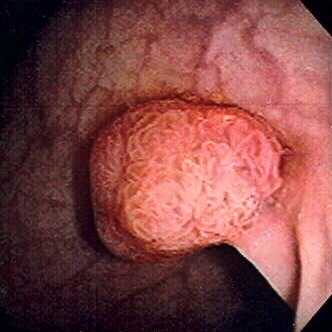Playlist
Show Playlist
Hide Playlist
Colorectal Cancer Screening with Case
-
Slides Large Intestine.pdf
-
Reference List Gastroenterology.pdf
-
Download Lecture Overview
00:01 Welcome. 00:02 Today we'll talk even further about disorders of the large bowel. 00:07 So we'll start with the case. 00:09 A 49-year-old man is seen in clinic for a routine visit. 00:13 He feels well with no symptoms. 00:15 He has a past medical history of hypertension, and a 20-pack year smoking history. 00:20 His father was diagnosed with colorectal cancer at age 58, so he is worried about his chances of having colon cancer. 00:29 He has heard there are many types of screening tests and is interested in the tests with the best ability to rule out cancer. 00:36 His vitals are normal and physical exam is unremarkable. 00:40 So which screening test for colorectal cancer is the best recommendation for him? Before we answer that, let's identify some key points in this case. 00:49 In general, so he's 49, in general at least in the U.S., we begin colorectal cancer screening usually at age 45. 00:57 Other society guidelines may recommend to start screening at age 50. Per the U.S. guidelines, he is due for screening. 01:05 In addition, he does have a first-degree relative with colorectal cancer diagnosed at age 58, so this is another indication to screen sooner. 01:15 In addition, it is important to note, that he asked for the test with the best sensitivity. 01:20 So here, as in with the real life patient, you always want to ask what the patient desires and try to determine which test meets their needs best. 01:30 So, as we said earlier, in general we start screening for colorectal cancer between age 45 to 75. 01:37 You might start sooner or later depending on different risk factors and which regional guidelines you are using. 01:43 So, some factors you might use to help you decide are: whether they have an inflammatory bowel disease, if they have a first-degree relative with colorectal cancer or an advanced adenoma that was diagnosed before age 60, whether they have a familial cancer syndrome, or African American race. 02:03 So some other major risk factors for colorectal cancer include advanced age, generally over 50, a personal history of adenomatous polyps, inflammatory bowel disease, a family history mostly a first degree relative with colorecatal cancer, and dietary factors also play a role. 02:24 So diet high in fat, high in red meat but low in fiber can place you at high risk for colorectal cancer. 02:33 So let's talk now about the various types of screening tests we have available for colorectal cancer The first type of test is the fecal occult blood test or an FOBT. 02:43 This is simply a small card on which a patient can place a small stool sample and then they can easily mail it in and have it analyzed for the presence of occult blood. 02:56 You may also do a CT colonography. 02:59 This is a 3-dimensional simulation of the colon, so it's a CT that we do to then get a look to the inside of the colon. 03:11 Lastly, you may also do a sigmnoidoscopy or colonoscopy which is really the most direct way to look at the colon and be able to intervene at the same time. 03:22 So now let's compare and contrast all of these variable tests. 03:27 These is one test called the fecal immunochemical test or FIT test. 03:30 It is done very similarly to the FOBT that we mentioned done before. 03:34 In general, it is done every year. 03:37 The advantage are that it is noninvasive and it is very convenient for patients to do since they are simply mailing in a stool sample. 03:45 The disadvantage, unfortunately is that it has a low sensitivity for detecting cancer. 03:51 An FOBT or fecal occult blood test is very similar in that it's done annually. 03:56 It is also non-invasive and convenient for patients but again, has low sensitivity. 04:03 Next, you could offer a CT colonography. 04:05 This is typically done every 5 years. 04:08 It is non-invasive since it's just a CT scan. 04:11 But, because it's just a CT scan, there's no ability to intervene if you find something suspicious. 04:19 You might also consider sigmoidoscopy This is usually done every 5 years. 04:24 It has excellent sensitivity for detecting abnormalities but is limited only to the sigmoid colon. 04:31 In addition it is invasive, it requires a bowel prep. 04:35 And as we mentioned, it really only visualizes the sigmoid colon. 04:39 So it's a bit limited in its reach. 04:43 And then lastly, a colonoscopy. 04:45 It’s really the gold standard for screening, it should be done every 10 years. 04:49 It has the highest sensitivity, of all of these tests. 04:53 The disadvantages, are that it too is invasive and requires a bowel prep. 05:01 As a quick aside, you should always remember that if a patient does have FOBT or a FIT test that turns out positive for occult blood, they must then be referred for colonoscopy. 05:15 So now that we know that, let’s go back to our case. 05:18 We have a 49-year-old man who is asking about the best test to rule out cancer. 05:24 He does have a first-degree relative with cancer diagnosed at age 58, which might prompt you to consider your screening sooner. 05:32 In addition, in the U.S., guidelines support starting screening at age 45, so he should begin screening now. 05:41 So, which screening test do we recommend for him? Since he's at elevated risk for colorectal cancer, with his first-degree relative, you should consider screening with a colonoscopy since he's asking about the test with the best ability to rule out cancer. 05:58 Colonoscopy has the highest sensitivity.
About the Lecture
The lecture Colorectal Cancer Screening with Case by Kelley Chuang, MD is from the course Disorders of the Small and Large Intestines.
Included Quiz Questions
Which of the following is the gold standard test for colorectal cancer screening?
- Colonoscopy
- Sigmoidoscopy
- CT colonography
- Fecal occult blood test
- Fecal immunochemical test
Which of the following is a risk factor for colorectal cancer?
- Inflammatory bowel disease
- Age younger than 50 years
- High-fiber diet
- Diet low in red meat
- Low-fat diet
Which of the following is the best next step if a patient screens positive on a fecal occult blood test?
- Colonoscopy
- CT colonography
- Fecal immunochemical test
- Abdominal ultrasonography
- Surgery
Customer reviews
5,0 of 5 stars
| 5 Stars |
|
1 |
| 4 Stars |
|
0 |
| 3 Stars |
|
0 |
| 2 Stars |
|
0 |
| 1 Star |
|
0 |
1 customer review without text
1 user review without text




